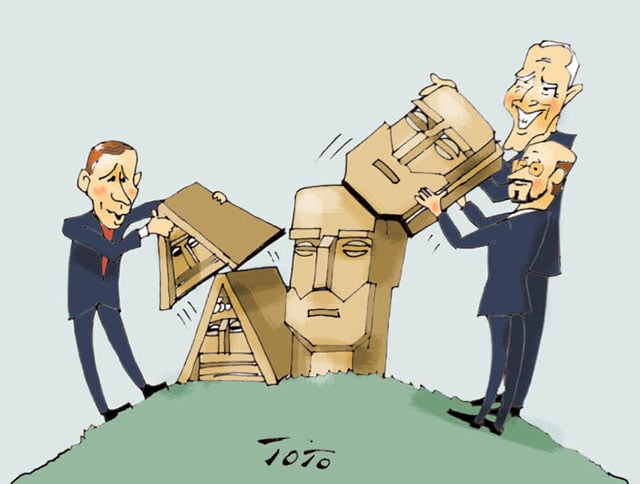by Edmond Y. Azadian
All indications point to the fact that Turkey and Azerbaijan have found the once-in-a-century opportunity to finish up the grisly job that they had begun 107 years ago. This conclusion should not be construed as an exaggeration in light of some historic facts.
In 1914, a situation was created in the Ottoman Empire which led to the implementation of some clauses of the Berlin Treaty of 1878, whereby European governors were sent to the interior provinces of the empire, not only to oversee but also to carry out reforms in the Armenian provinces. The government’s mistreatment of the residents of those provinces had led to the locals’ agitation, putting fear in the hearts of the Ittihadist rulers that Armenians were on their way to independence, thus breaking up the empire.
Read also
One of the reasons Turkey entered World War I, on the side of Germany, was to prevent that breakup from happening. And indeed, the war offered an opportunity for them to eliminate the Armenian problem once and for all by wiping out the population entirely. That task was facilitated by the fact that the Russian forces, which had occupied the Eastern Provinces of the empire and were defending the physical security of the Armenians, decided to withdraw as a result of the Russian Revolution.
Throughout history, based on their own interests, the Russians have protected Armenians and defended their rights. But that role has not been a permanent enough feature in the Russian-Armenian relations to justify a blind pro-Russia policy in Armenia.
Currently, a similar scenario is playing out in the Caucasus, where Russia’s traditional hold over the region is in tatters because of the war in Ukraine, offering an opportunity for the Turkey-Azerbaijan tandem to deal a crushing blow to Armenia’s very existence. That prospect is necessitated by President Recep Tayyip Erdogan’s imperial ambitions to reach the Turkic republics of Central Asia, with the hope of building a new Turanic empire.
Since the 44-Day War, Turkey has become fully invested in the region and entrenched on the ground, in plain view of the impotent Russian side.
As Russia’s sphere of influence shrinks in the region, the West has also been demonstrating renewed interest there and Armenia is one of the political footholds that they can use against Russia.
To date, Armenia’s defenses and economy have been fully integrated with those of Russia. To extricate Armenia from the Russian embrace will prove to be painful. Indeed, a weakened Russia may exact harsher vengeance from Armenia.
Armenia had pinned its hopes for safety on the presence of the 102nd Russian military base in Gyumri and its long-term treaty agreement with Moscow. In addition to these supposed guarantees, Armenia had joined the Moscow-led Collective Security Treaty Organization (CSTO), created as a counterpart to NATO. But neither of those relationships offered any help during the 44-Day War, which, for all practical purposes, continues to this day.
Armen Khachatryan, deputy minister of defense, announced at a security conference of Commonwealth of Independent States (CIS) countries recently that Azerbaijan has occupied 127 square kilometers of Armenia’s sovereign territory since September 2022 and demanded that the forum condemn Baku as the aggressor. The amount of land occupied was a surprise; thus far, it had been believed that Azerbaijan had occupied 51 square kilometers.
US Secretary of State Antony Blinken’s direct call to Azerbaijan and French President Emmanuel Macron’s harsh characterization of the latter have not yielded any results and Azerbaijan continues to hold on to those territories and threatens to occupy even more.
Russia’s lackluster defense of its ally has led many to call the CSTO a toothless structure, which Armenia does not need in this dire situation. Armenia’s membership in the CSTO not only does not offer any hope for security, but it also serves as an impediment for it to seek defense and arms from elsewhere.
These trends in Armenia are being fueled by the West’s renewed interest in the region and particularly President Macron’s call that “France will stand by Armenia.” This statement has angered not only Azerbaijan but also Russia, as if Armenia does not deserve any support from major powers and should be left to the tender mercies of Turkey and Azerbaijan.
At this time, there are 40 EU monitoring experts on the Armenian side of the border with a mandate of two months. Azerbaijan has refused to host them on its territory lest they report its atrocities and destruction on the border regions.
“The situation remains very dangerous, the instability is high, and the resentment of 30 years of conflict is great,” says Toivo Klaar, the EU special representative for South Caucasus and Crisis in Georgia. “There are not many international players other than us, which is why we must be even more involved.”
As if these statements were not enough to irritate Baku and Moscow, now the Organization for Security and Cooperation in Europe (OSCE) Minsk Group is about to send its own observers.
Of course, any sign of the resurrection of the OSCE Minsk Group causes concern in Baku, because it is the only international structure that still maintains that Artsakh Armenians have the right to self-determination. On the other hand, the Kremlin is worried because it believed it was its divine right to shape the destiny of the peoples in the region.
“The OSCE mission has no mandate,” stated Azerbaijan’s Foreign Minister Jeyhun Bayramov, adding, “Any group called the OSCE ‘needs assessment mission in Armenia’ does not have an OSCE mandate, cannot be associated in any way with the OSCE and none of its results nor reports can be accepted as an OSCE document.”
But the advance technical group is already in Armenia, surveying borders and planning a monitoring mission in the near future.
Russia is worried that its role is being taken over by other powers, whose ultimate goal is to undermine its position in the region.
As soon as the news came about possible deployment of the monitors, Russia’s Foreign Minister Sergey Lavrov announced that the CSTO was also ready to send an observer team to Armenia.
It is ironic that unlike the EU or OSCE missions, the CSTO delegates cannot play the same independent role and monitor the border because Armenia is part of the CSTO monitoring zone as a full-fledged member. By definition, the CSTO has already been (or should have been) deployed on Armenia’s territory to defend it. But the fact is that Armenia invoked Article 4 of the organization through which a nation under attack seeks help from the CSTO and that structure did nothing.
Despite all this, things are moving in Armenia’s favor, to the chagrin of Russian leader Vladimir Putin and Azerbaijan’s’ President Ilham Aliyev, and Armenia’s leaders now have to demonstrate enough diplomatic skills to turn the tide in the region.
To top all these developments, this week Iran opened a consulate in Kapan, Syunik, with great fanfare in the presence of Iran’s Foreign Minister Hossein Amir-Abdollahian, who stated that “Armenia’s security is Iran’s security.”
He also revealed that Tehran had played a crucial role in deterring Azerbaijan from engaging in a full-fledged war, during the September 13 aggression.
It is the first time that cracks are appearing in the Iran-Azerbaijan relations, after Baku hosted, last month, the defense ministers of Turkey and Israel and the foreign minister of Saudi Arabia. From all appearances, they had been plotting against Iran.
To woo Armenia back into its fold, President Putin, whose hands are already full with the ill-advised war he launched in February, has invited Prime Minister Pashinyan and President Aliyev to Moscow at the end of October to work out the peace treaty between the two countries.
It is unlikely that Mr. Putin can offer any comfort to Armenia, nor broker a peace deal. At best, it is a tactical ploy to discourage Western interference in the Caucasus and send the false message to the West that he still has full control of the region.



























































